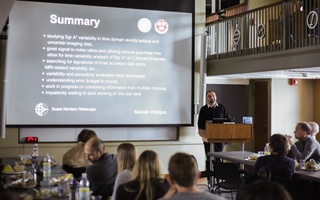World-famous theoretical cosmologist Stephen W. Hawking discussed the history of and recent breakthroughs in research on black holes at the inauguration of Harvard's Black Hole Initiative in Sanders Theatre on Monday afternoon.
Interspersing jokes throughout his lecture, Hawking discussed the implications of recent developments demonstrating that the size of black holes may indicate how much information they hold and that they also emit thermal radiation.
“The message of this lecture is that black holes ain’t as black as they are painted,” Hawking said. “So, if you feel you are in a black hole, don’t give up. There is a way out.”
In addition to serving as the inauguration of Harvard’s Black Hole Initiative, an interdisciplinary program designed specifically to research black holes, Hawking’s talk celebrated the 100th anniversary of the publication of Albert Einstein’s theory of relativity.
According to Chair of the Harvard Department of Astronomy Avi Loeb, who introduced Hawking at the event, the Black Hole Initiative will bring him together with five other scholars, including Astronomy lecturer Sheperd S. Doeleman, History of Science professor Peter L. Galison, natural sciences professor Ramesh Narayan, and Physics professor Andrew Strominger.
Loeb, who serves as the founding director of the Black Hole Initiative, said the organization’s uniqueness ultimately drew Hawking to provide the inaugural lecture.
“The goal is to bring these people together that otherwise do not meet very often and to cultivate a sort of culture of people interested in black holes,” Loeb said. “It’s the only center worldwide that is focused on research on black holes and because of that, Stephen Hawking made it a special priority to come here.”
According to Loeb, space has already been allocated for the Black Hole Initiative on 20 Garden St., but he is waiting for the funding application to be approved in the coming weeks.
Once approved, Loeb hopes the initiative will host student programs that would give undergraduates and graduate students the opportunity to participate in workshops and contribute to research on black holes.
Andrew W. Mayo ’17, a Physics and Astrophysics concentrator, lauded Hawking for his dynamic presentation.
“There are not a lot of lecturers who are able to keep the audience engaged,” he said. “This was one of those lectures that was able to do that.”
—Staff writer Beth Young can be reached at beth.young@thecrimson.com. Follow her on Twitter @thebethyoung.Read more in University News
Global Media Jumps on Porcellian Club ControversyRecommended Articles
-
 'The Theory of Everything,' Explained
'The Theory of Everything,' Explained -
Politicizing the MainstageThe norms of Harvard theater restrictively dictate where and how actors and characters of color can exist; as unintentional as it may be, the theater community at Harvard oversamples and over-represents whiteness.
-
Black Hole Initiative Receives $7.2 Million in FundingHarvard’s newly formed Black Hole Initiative received funding two weeks after world-renowned astrophysicist Stephen Hawking spoke about the initiative to a packed Sanders Theatre on April 19.
-
 Astronomers Discuss Black Holes, Cosmic Radiation at Luncheon
Astronomers Discuss Black Holes, Cosmic Radiation at Luncheon -
Sciences Faculty Remember Stephen HawkingHawking, who died last Wednesday at the age of 76, was a renowned English theoretical physicist and cosmologist.













